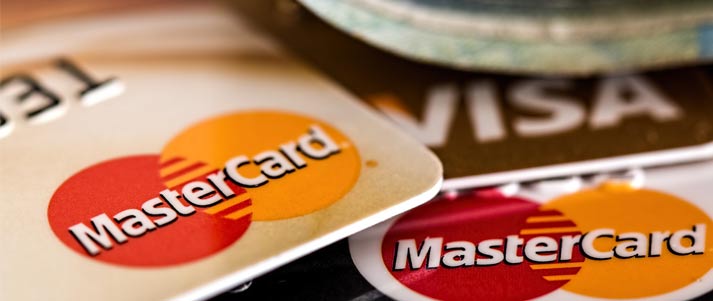Best student credit cards 2025
Credit cards don't have to be a fast track to doom and debt. Use them to work for you and you'll reap the benefits. Here's how to be fantastic with plastic.

Credit: Dean Drobot – Shutterstock
The world of credit cards may seem a bit daunting – there are so many horror stories about getting into debt using them.
There are risks to be aware of. But it's also important to know about the ways in which they can help you budget and increase your credit score if you use them properly.
Students often struggle to get a regular credit card because they lack the required credit history. There are, however, student credit cards available.
To help you make the right choice, we'll go through the key things to know before getting a credit card. The below info includes how to manage repayments, along with a list of the best student credit cards.
What's in this guide?
How do credit cards work?
Put simply, a credit card is a tool for delaying payment for your purchases.
When you buy something, the credit card company lends you the money. You then pay them back at a later date. As with most loans, the amount of interest you pay increases depending on how long you take to repay.
Some credit cards have 0% interest for several weeks (or even months), which in turn helps with budgeting. There are other key benefits too, as we'll explore below, without neglecting the pitfalls.
What is a student credit card?
A student credit card caters for college and university students who don't have the income and credit score needed to be approved for a standard credit card.
Student credit cards do have some downsides, though. They usually have lower credit limits, higher APRs and generally offer fewer rewards.
However, used in the right way, student credit cards can be a good way to manage your finances and build your credit score. Doing so will help you later in life when you want to buy a house or apply for a credit card with better rewards.
Benefits of a student credit card
There are five key reasons to get a credit card for students:
- Credit score – Credit cards can improve your credit score if you manage them well. You'll need a decent credit history to get financial products (like a mortgage) later on in life. The better your score, the better the deals you'll be offered.
- Section 75 protection – If you pay for items costing over £100 and up to £30,000 with a credit card, Section 75 protection means the credit card company can refund you if something goes wrong. You can even just pay a deposit by credit card to be eligible to claim for things like a retailer going bust, non-delivery, cancellation and fraud.
- Money management skills – Learning how to run a credit card account properly teaches you important personal finance skills that could also see you better off in the future.
- Rewards – Similar to student bank accounts, credit cards often come loaded with cashback and rewards. As long as you've got a sound repayment plan, you could be quids in.
- Emergency funds – They can also potentially be used for emergency funds while you're waiting for your next Student Loan instalment. However, there are other lower-risk funding methods to try first. These include your 0% overdraft, a part-time job, some money from your parents or hardship funds from your university.
Things to consider when applying for a credit card

Credit: UfaBizPhoto – Shutterstock
Here are the things to consider before applying for a credit card:
- Repayments – Never spend more than you can repay within the 0% interest period.
- Credit score – Check your credit history before you apply. You can take steps to improve your score if you need to.
- Credit card applications – Don't make multiple applications too close together. This can affect your chances of being accepted. Pick one card that not only delivers what you need, but also that you believe you'd be accepted for.
- Annual Percentage Rate (APR) – Check the APR (this includes added interest and fees). This indicates how much extra you'll be charged if you don't pay your balance off in full each month. If you're a bit rusty on your banking jargon, see our guide that explains what APR is.
- T&Cs – Make sure you understand the terms and conditions of any promo deals, including minimum spending or repayments.
- Penalty charges – Check all the penalty charges linked with using the card, including going over your credit limit, spending abroad or withdrawing from cash machines (although you should avoid all these things anyway!).
Should you get a normal or student credit card?
Credit cards for students don't usually offer great rewards, but you may have a better chance of getting one. They come with smaller credit limits (minimising your chances of stacking up lots of debt) but tend to have higher APRs. That means it can be costly if you don't clear your balance in full.
Standard credit cards open up your options in a couple of ways. If you're ultra-disciplined, a 0% purchase card gives you a window of interest-free spending. You could do all your regular shopping on a 0% card while letting your own funds build up in a savings account (earning you a bit extra in interest).
That said, it's still important to only buy what you have the cash for and to keep that money safe until you need it to clear your balance. The aim is to always repay in full before the interest kicks in. In other words, always plan ahead.
If you like the idea of rewards, a cashback or points card can earn you anything from money back to airport lounge access and store vouchers. It can be worth it if you're loyal to one store or supermarket.
Again, rewards are only valuable if you're scrupulous about clearing your balance in full each month. Otherwise, any extra charges, penalties (or fees for paying by credit card) could wipe out any gains.
What happens to your student credit card after graduation?
Well, it won't magically disappear. You should still be able to use your card as normal. But if you've used it responsibly, you might be able to move on to a standard credit card with better interest rates and rewards.
Best credit cards for students 2025

Whether you're accepted for a standard or student credit card depends on a number of factors (such as your credit score). You'll need to check the small print for yourself.
Some banks also won't offer a student credit card as an option until you've had a student account with them for a few months, so there may be some waiting involved.
Student credit card comparison
Please note that the exact terms of your card, such as the credit limit, will be determined by the bank based on your financial circumstances. They may differ from the term in the table. Please check the terms for yourself before making any decisions.
And if you're after more options, have a look at some comparison websites like MoneySuperMarket.
How to manage credit card spending and repayments
These tips will help you manage your spending with a credit card:
- Only buy things you can afford – Only use credit cards to buy things if you're sure you can cover the repayments.
- Pay your statement balance in full – Always try to pay off your credit card bill in full each month. Only ever making the minimum payment is a false economy, as it'll take longer to clear your balance and make your purchases cost way more.
- Use Direct Debit – Set up a Direct Debit from your current account to automatically pay the balance (or any other amount) owed on your credit card. Just make sure you've got enough money in your current account.
- Pay what you can – If you can't clear the balance in full, you should still pay as much as you can towards your bill. Missing minimum repayments could affect your credit score and hit you with penalty charges, too.
- Buy high-value items on a credit card – This is because purchases worth over £100 and up to £30,000 will be covered by Section 75 protection against the retailer going bust, or your item not being as expected. It can help with things like summer holidays and new gadgets. It's a good idea to pay directly with your credit card to get S75 protection (i.e. not via PayPal or other payment services). But, again, make sure you can afford the repayments before paying with your credit card.
- Make the most of credit card rewards – Going after rewards points, cashback or air miles? It could be worth using your credit card for everything to build up better bonuses, while your Maintenance Loan, salary or other income sits tightly in your savings account, gaining extra interest. Just make sure you've still got the cash to cover your spending.
- Never withdraw cash on a credit card – You could be charged a higher interest rate than you'd get on purchases, as well as a handling fee. Either way, it's going to cost you – so don't do it. If you want to transfer cash available from your credit limit into your current or savings account, ask if the card company offers a money transfer service instead. Check the terms carefully, though.
- Don't spend more than your credit limit – By doing so, you'll face penalty fees. Keep an eye on your spending, particularly towards the end of the month. As well as spotting potential fraud, you can see at a glance whether you're keeping to a budget, when you need to pay, plus any rewards or interest that you're accumulating.
- Don't forget about your credit card – The jury's still out on whether getting a credit card but not using it will do anything useful for your credit score. However, tucking it away and forgetting about it isn't great for fraud prevention.
- You only need one credit card – Any more than that and it just gets stressful.
Credit card jargon

Credit: Kaspars Grinvalds – Shutterstock
Selecting a credit card can be tricky, especially with all the jargon they use to bring you in. Our jargon buster will help you understand the words that banks use, so you know exactly what you're signing up for.
0% introductory rate
If there's a 0% introductory rate, this means that, during the initial introductory period after taking out the card, you won't be charged interest on the outstanding balance. It's possible you'll be required to make a minimum payment each month.
Interest
If you don't pay off your credit card bill in full (and you're not within the 0% introductory rate period), you'll be charged interest on the remaining balance. This is typically charged monthly. With each monthly repayment, your debt reduces, which in turn reduces the total you're charged in interest.
Limit
This is the most you're allowed to borrow from your credit card provider, which is shown on your statement. This limit will depend on your credit score.
Outstanding balance
The outstanding balance is the current amount of money you're borrowing from the credit card provider, which is shown on the statement. Interest is normally charged on this each month.
Representative APR
APR is short for Annual Percentage Rate, and this is the estimated cost of borrowing money (interest + fees). Not everyone will be offered the same rates for their credit card, but the representative APR is there to give you a general idea of how much you'd need to pay.
Balance transfer
If you have an outstanding balance on a credit card or loan, a balance transfer card lets you put your debt on a special type of credit card. Even with 0% interest offers, you'll likely be charged a fee for transferring.
The key to happy credit is knowing how it works and using it responsibly. Only take on what you can cope with and always what you can afford to repay.
Not quite ready for a credit card yet? Check out the best app-based and online bank accounts that can help you with your budgeting.








